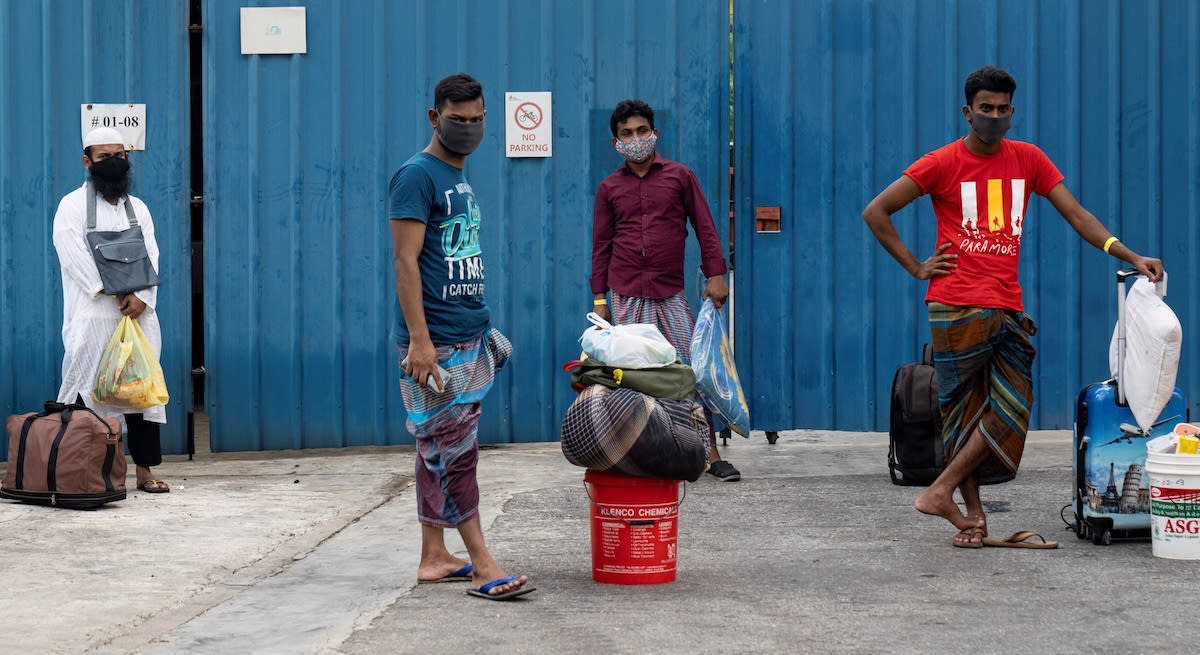Earlier this month, an ST Forum article discussed how “all of us are guilty of poor treatment of foreign workers.”
It caused an uproar among netizens, with many Singaporeans pushing the blame to the government for the plight of the migrant workers today.
Only a handful of us actually acknowledged that Singaporeans were at fault for the widespread infection of Covid-19 that has been plaguing the migrant workers’ dormitories.
This entire debate about the treatment on migrant workers had me thinking about when, and how, did it exactly went wrong.
Inaction From Singaporeans

The vast majority of Covid-19 cases were found among Singapore’s migrant workers community.
The spotlight on the migrant workers later revealed that their provided lodgings are often overcrowded and lacking in adequate sanitary facilities.
How could we turn a blind eye to their poor living conditions all this while? How come no one did anything about it?
To be frank, I felt guilty for not being aware, or even remotely interested, in their living conditions — much like other Singaporeans.
But since Covid-19 broke out in their dorms, many Singaporeans suddenly became interested in their living conditions and started championing for their rights.
Prior to this, right groups such as Transient Workers Count Too (TWC2) had already been trying to enlighten us about their cramped living conditions. But did we react and try to help improve their situation?
Had we done something then, this widespread Covid-19 infection may not even be happening.
The only reason why foreign workers’ dormitories are on our radar lately is because of the (bad) coverage we have been getting on a worldwide level.

Media publications including South China Morning Post, Nikkei Asian Review and Foreign Policy have ran articles on the situation and mocked how Singapore has went from being lauded worldwide for setting a “gold standard” in its Covid-19 response, to becoming a country that has failed its migrant workers.
Some Singaporeans are genuinely concerned about migrant workers, but many are still only concerned about the bad press that Singapore is getting internationally and how a severe economic recession (due to the shutdown of migrant-reliant sectors) might affect them, and they just want the problem fixed.
– Alex Ku, Vice-President of rights group Transient Workers Count Too
Once Covid-19 is over, inattention and neglect will return, he added.
Discriminating Foreign Workers
Pre-covid 19, hardly any of us took an interest in the migrant workers’ daily lives.
Some of us even adopt discriminatory attitudes towards the migrant community who have helped power the city’s growth, building hospitals and subway lines and maintaining our roads in the dead of night.

Despite their contributions, many chose to display xenophobia towards them. We frown upon and complain of congestion when foreign workers swarm Orchard Road, City Hall and other town areas during their off days.
We objected when the government proposed to build the dormitories near the HDBs we are living in, citing health and safety concerns.
We take for granted the cheap labour they offer, not realising the fact that our economy and industries were prospering because of the low labour costs.
While there are occasions like the Migrant Workers Awareness Week and Singapore Kindness Week where we show appreciation for them, how many of us actually take the time to celebrate them?
If we don’t care for them now, is there any chance that we would start to care more for them after the Covid-19 pandemic?
Not Lending Our Voices
Besides discriminating, we didn’t care for their livelihoods because we were too busy dealing with our first-world problems.
While rights groups such as Migrant Workers Centre and TWC2 have been campaigning for the migrant workers for years, their efforts alone is not enough and they need holistic support from the society.
For the migrant workers, they don’t dare to voice out about the mistreatment for fear of being deported back to their home country.
Singapore’s Work Permit system gives wide powers to bosses to hire and fire at will, and the huge recruitment fees that workers have to pay (thus leaving them in debt and in great fear of losing their jobs) has created an ecosystem where the exploited cannot even voice out their dissatisfaction without severe consequences.
– Alex Ku, Vice-President of rights group Transient Workers Count Too
Any and every little complaint can result in him being fired and sent home, leaving his family without a breadwinner.
So, no matter how dissatisfied a migrant worker may be — be it about housing, salary non-payment, the bullying attitude of the boss, or lack of safety measures — he tends to keep quiet about it until he has nothing more to lose.
On occasions when TWC2 engaged in confidence with the men about what they really thought of their dorms, we’ve heard a range of feelings and it’s more negative than positive. So we do know that they have long been unhappy with life in the dorms.
– Alex Ku, Vice-President of rights group Transient Workers Count Too
Inaction on our part, coupled with fear from migrant workers to voice out, means that their grievances will not be heard and nothing will change.
Pinning The Blame On Anyone But Ourselves
As if those were not bad enough, we are often quick to push the blame to the government.
On hindsight, it’s true that the government is responsible for their housing conditions.
In the words of former Non-Constituency Member of Parliament (NCMP) and now Workers’ Party politician Yee Jenn Jong, “it is the responsibility of the elected government to do proper legislation, set clear policy directions to ensure what role we want foreign workers to play in our economy and how to ensure that living conditions are suitable.”
Granted, more can be done for them. Issues of unsanitary and cramped living conditions in the dormitories have plagued the migrant worker community for a long time now.

Yet, these issues are only brought into the limelight now, when the surge of foreign worker infections threaten to overwhelm our healthcare system or spillover into the local community.
With that, we have to acknowledge that our government is not perfect in its handling of migrant workers.
This serves as a major test for the Singapore government as the entire world will be watching how we resolve the issue. As of now, it remains a question whether Singapore would still continue to house these workers in cramped living conditions post-Covid 19.
However, instead of pushing the blame entirely to the government, let’s take this time to reflect on ourselves too. A vast majority of us turned a blind eye towards these migrant workers issues that have been pre-existing for years.
Shift In Mindset Needed

Many of us would argue that we do not have the power to change things, but that is just a weak excuse.
Every citizen of Singapore has the right to freedom of speech and expression.
The hard truth is, Singaporeans simply don’t care enough to voice out on their behalf. If we care enough, the situation would not be as dire as it is today.
After Covid-19 has blown over, we may just return back to our usual lives and continue being indifferent towards their livelihoods.
If we genuinely want to help the migrant workers, we have to change our mindsets.
Singaporeans have always taken a us-versus-them mindset towards migrant workers, but we should start acknowledging that the foreign workers are part of Singapore and they have played an integral part in our nation’s development so far.
Only with a we-are-one mindset would we be able to improve the living conditions of foreign workers in Singapore.
Featured Image Credit: Getty Images








